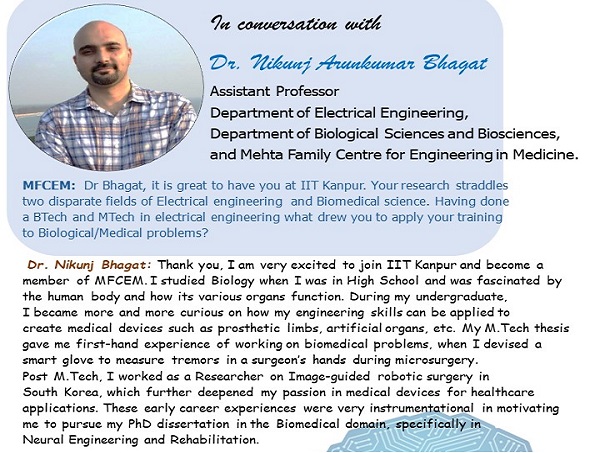
In conversation with
Dr. Nikunj Arunkumar Bhagat
Assistant Professor
Department of Electrical Engineering,
Department of Biological Sciences and Biosciences,
and Mehta Family Centre for Engineering in Medicine.
MFCEM: Dr Bhagat, it is great to have you at IIT Kanpur. Your research straddles two disparate fields of Electrical engineering and Biomedical science. Having done a BTech and MTech in electrical engineering what drew you to apply your training to Biological/Medical problems?
Dr. Nikunj Bhagat: Thank you, I am very excited to join IIT Kanpur and become a member of MFCEM. I studied Biology when I was in High School and was fascinated by the human body and how its various organs function. During my undergraduate, I became more and more curious on how my engineering skills can be applied to create medical devices such as prosthetic limbs, artificial organs, etc. My M.Tech thesis gave me first-hand experience of working on biomedical problems, when I devised a smart glove to measure tremors in a surgeon’s hands during microsurgery. Post M.Tech, I worked as a Researcher on Image-guided robotic surgery in South Korea, which further deepened my passion in medical devices for healthcare applications. These early career experiences were very instrumentational in motivating me to pursue my PhD dissertation in the Biomedical domain, specifically in Neural Engineering and Rehabilitation.
MFCEM: Could you shed some light on the larger research vision of your lab.
Dr. Nikunj Bhagat: The vision of my lab is to develop neuro-technologies that can integrate with our body’s nervous system in order to repair, restore, or replace any damaged neural pathways, caused by a neurological disease or injury. Broadly, I am interested in 2 types of problems: First, is the forward or decoding problem where we want to understand brain activity and use it to drive external devices such as a robotic limb for restoring movement in a paralyzed person. This technology is sometimes also called an electronicneural “bypass”. Second, is the reverse or encoding problem where we want to study theeffect of such a neural bypass on the brain and its ability to repair and restore the damaged neural pathways. To address these questions, we are focusing on different technologies such as brain-computer/machine interfaces, electrical stimulation, neuro-rehabilitation, and bio/neural feedback.
MFCEM: Does having your lab in the Mehta Family Centre for Engineering in Medicine at IIT Kanpur, as compared to a traditional biology department, help you in any way further your research goals?
Dr. Nikunj Bhagat: What I admire about MFCEM is that it is clearly focused on translational medicine for patient-centric problems. It will serve as an enabling platform for engineers, clinicians, scientists, and research scholars to come together and work on solutions that target specific issues in the Indian healthcare system. Moreover, IITK is investing in developing an entire MedTech ecosystem, including the Gangwal School of Medical Sciences and Technology (GSMST) and the Start-Up Incubation and Innovation Centre (SIIC), which together with MCFEM, will fast-track the development and clinical translation for various drugs and devices. I feel having such an ecosystem is what distinguishes IIT Kanpur from other Institutions of our country.
MFCEM: We are currently witnessing a paradigm shift in approach towards health care delivery and medical research in our country. How do you see the growth of MedTech innovations in India in the near and far future.
Dr. Nikunj Bhagat: Access to healthcare has tremendously improved with the advent of smartphones and digital technology. Moreover, a number of startups have come up that are working on med-tech solutions for the Indian population. However, a lot of medical research and innovations are still funded only through government grants or philanthropic donations. We need more buy-in from Industry, for example by setting up R&D labs or by promoting industry-university collaborations, in order to grow and sustain our med-tech industry. At the same time, we also need to be cognizant that as compared to other industries, med-tech development takes years at a stretch and investors, VCs must set realistic expectations from startups in terms of their return on investments and time-to-market horizons.
I recently read[1] that India is becoming a global venue for conducting clinical trials. While this is encouraging, I would really like to see a number of these drugs and devices being indigenously developed in India rather than only being validated in the Indian population.

